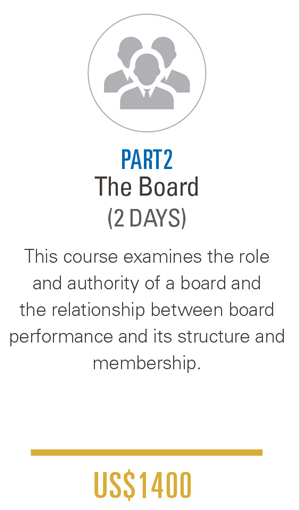Part 2: The Board
(2 day workshop)
This course examines the role and authority of a board and the relationship between board performance and its structure and membership.
The course will:
- Describe the board’s governance roles and responsibilities
- Differentiate managing versus directing and identifying dilemmas
- Discuss the role separation of chairman and CEO
- Analyze directors’ legal duties and liabilities
- Identify the characteristics and benefits of a balanced board
- Define types of directors and their leadership attributes
- Describe good practices in managing board directors’ roles, responsibilities, committees, and remuneration
- Identify good practices for effective board meeting preparation, conduct, and follow-up
- Clarify board meeting roles and responsibilities of the chairman, directors, and corporate secretary
Part 3 Strategy and Risk
An essential requirement for an effective board is for the directors to provide the strategic direction for the company as a whole is their ability to deal effectively with dilemmas facing the board. This workshop explores how a strategy is how a orients the company towards its market and its competitors. Flawed strategic thinking at board level can create massive value destruction and even threaten a company’s survival.
Risk management is also a key role of all boards. Companies take risks to generate returns. The board is responsible for ensuring that all business risks are identified, evaluated, and suitably managed. In a world of increasing complexity and uncertainty, directors must manage risk more assiduously than ever before. Enterprise risk management (ERM) is a structured, consistent, and continuous process across the entire company (usually large companies) for identifying, assessing, responding to, and reporting on opportunities and threats that affect the achievement of the company’s’ objectives.
The amount of risk varies not only with the type of business or its market circumstances, but also with the business’s position in its life cycle. Young, high-growth businesses will be more vulnerable than mature, stable businesses. Directors must decide, acting on management’s advice, how much risk the company can accept. This risk appetite may vary over time and will be influenced by the company’s financial condition and market position.

Part 4 Corporate Reporting
This workshop explores the financial stewardship and accountability obligations of the Board to shareholders and stakeholders.
What will be covered?
- Financial stewardship and financial oversight
- The international and local accounting environment
- Financial statements and their relation to liquidity, profitability, and performance
- The consequences of inadequate financial information
- The reporting environment
- Narrative reporting
- The regulator’s role in enforcing reporting obligations
- Effective share-owner communications and investor relations
- Sources of corporate finance
- Capital gearing, dividend policy, and valuation
- Capital investment appraisal techniques
- Financial crisis indicators
- The control environment, board responsibilities, and internal controls
- The audit committee
- Whistle blowing, current oversight concerns, and regulatory developments
The workshop is highly interactive and includes presentations, tools, guides, case studies and simulations.